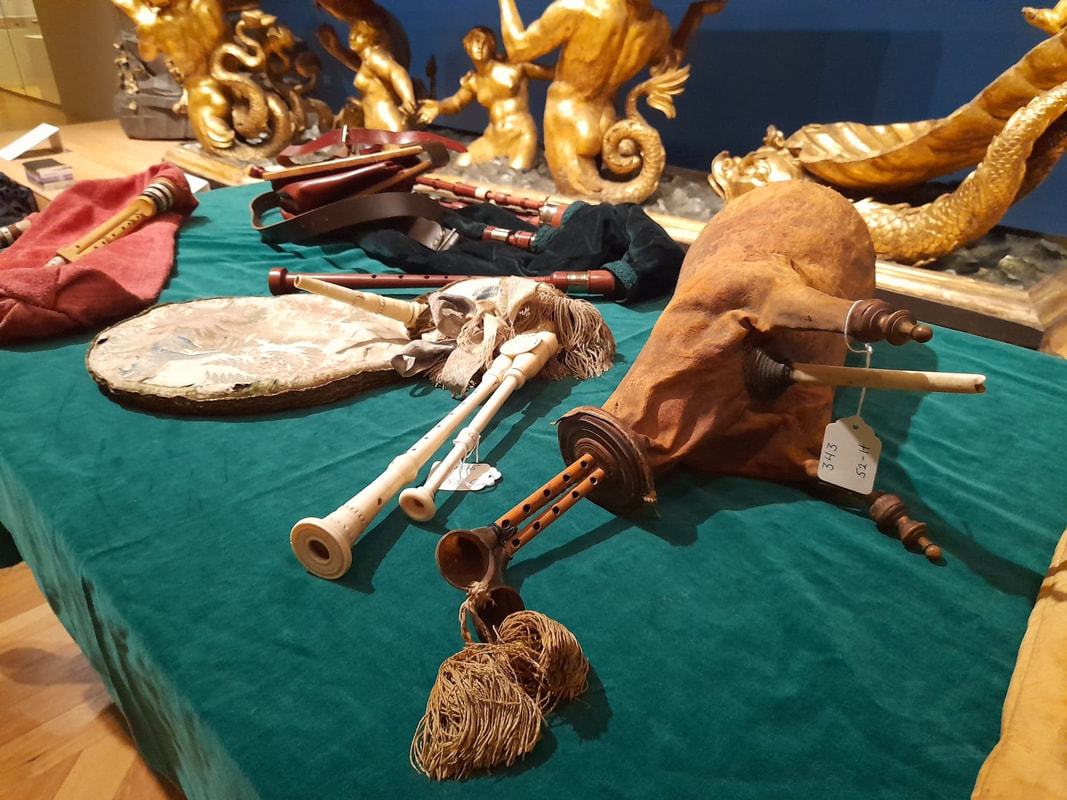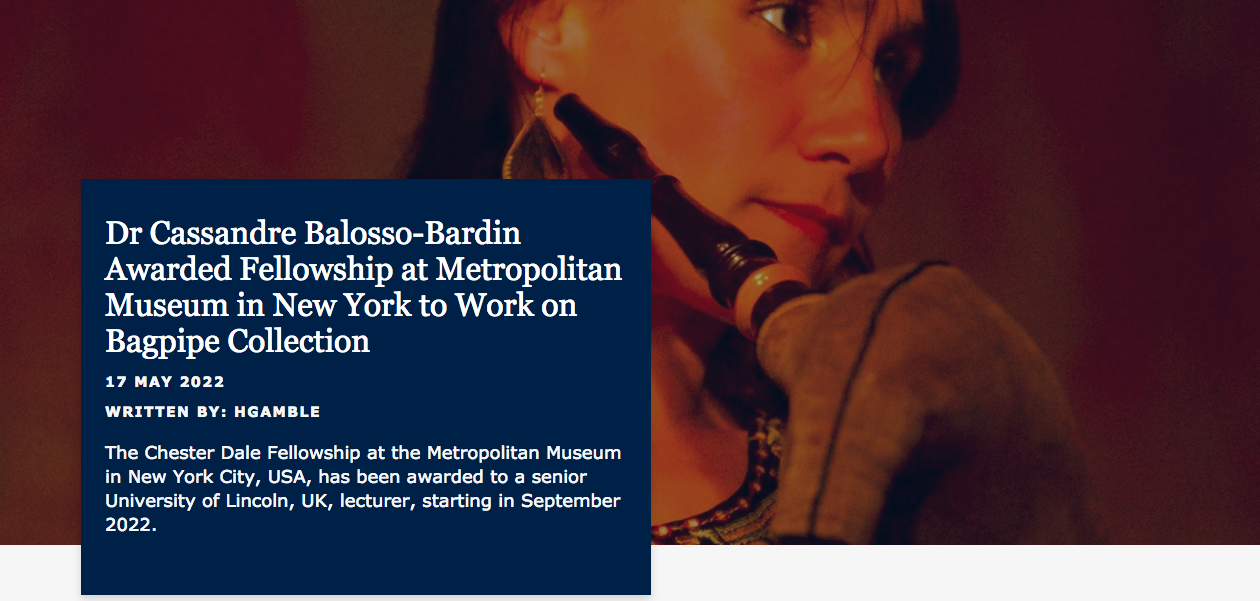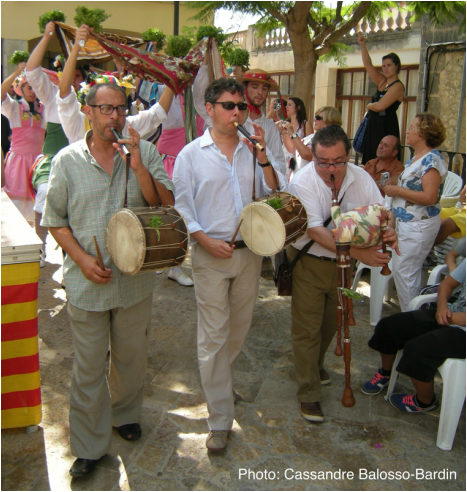Overview
Cassandre Balosso-Bardin is an Assistant Professor in Cultural Musicology at KU Leuven in Belgium. Before this appointment, she was Associate Professor in Music at the University of Lincoln, UK, where she lectured from 2017 to 2022. Her research areas include musical instruments, instrument making, revivals, intercultural music making, Mediterranean music, bagpipes and applied ethnomusicology.
|
In 2022-23 she was a Senior Fellow at the Metropolitan Museum of Art, where she held a Chester Dale Fellowship. Within the Musical Instruments Department, Cassandre carried out the first overall study of the museum's extensive bagpipe collection.
In 2016, she worked as a postdoctoral fellow at Paris-Sorbonne, within the GeAcMus project (Geste Acoustique Musique), an interdisciplinary and inter-institutional project on music, acoustics and musical gestures. In 2015 she completed a PhD in ethnomusicology at SOAS, University of London, under the supervision of Professor Keith Howard. The PhD is entitled: The Mallorcan bagpipes (xeremies): anthropological portrait of an instrument. She was employed by SOAS as a Graduate Teaching Assistant from 2012-2015 teaching the Introduction to Music Analysis tutorial (BA course, convenor: Richard Widdess) and co-convening the Digital and Traditional Broadcasting Communication MA course with Caspar Melville. Cassandre has presented at numerous national and international conferences and was awarded the 2015 BFE Student Paper Prize for her paper 'From Paris to London – Learning Ethnomusicology on both sides of the channel / De Paris à Londres – Apprendre l’ethnomusicologie des deux côtés de la Manche'. She has given talks on her research at different universities including Cambridge University, Newcastle University, Royal Holloway University, SOAS, Liverpool University, Bath Spa University, the Royal Conservatoire of Scotland (Glasgow), Sorbonne Université (Paris), the EHESS (Paris), Gothenburg University (Sweden) and Queen's University (Belfast). Cassandre previously studied Music and Musicology at La Sorbonne (BA and MA) in parallel to her performance studies at the Conservatoire a Rayonnement Départemental de la Vallée de Chevreuse with Jean-Pierre Nicolas. She also holds an MA in English linguistics (La Sorbonne Nouvelle) and a degree in ethnology (Université Paris Ouest Nanterre La Défense). She obtained an Erasmus grant to study musicology and ethnomusicology at Cologne University in 2006-7. Cassandre is also the founder and director of the International Bagpipe Organisation, and organises the biennial International Bagpipe Conferences. She used to run a radio podcast called Bagpipes Galore at SOAS Radio that features different bagpipes around the world. |
Metropolitan Museum Senior Fellowship
|
The Metropolitan Museum's 53 bagpipes span 800 years and extend across a vast geographical region from India to Ireland. Additionally, the Met counts an additional 108 objects (paintings, engravings, figurines) featuring bagpipes, including a world-renowned print by Albrecht Dürer (1514), 18th century porcelaine plates made in China for a British or Scottish market, and a finely carved golden mechanical bagpipe player, featuring the highly technical Italian sordellina, designed to be played with a 17th century harpsichord by Todini.
Using historical archives, (ethno)musicological literature and interviews with musicians, I am studying the museum’s bagpipe collection as a whole, as well as cross-referencing it with the Metropolitan Museum’s wider visual art collection, which will allow the development of a more global overview of the instruments, and will support the in-depth study of certain objects’ history thanks to the conservation of some rarer specimens. I will also examine Mary Elizabeth Adams Brown’s notes and correspondence in order to understand the acquisition history of the instruments and form a relevant unity. |
Music and Minorities
|
Since 2017, I have worked within University of Lincoln to invite local minority communities to collaborate with the university's staff and students on a cultural and musical event, Hidden Gems. Initially organized through a research project reflecting on 'memory, migration and music' for Lincolnshire-based Eastern Europeans (Jones 2017), the event's unexpected sell-out success led university management to support and encourage following iterations, fitting in with the institution's civic engagement policy (Fazackerly 2018). The 2017 and 2019 events, organized with the help of Lincolnshire's Eastern European and Arabic communities respectively, used music and performance as a vector for empowerment, visibility and engagement to foster dialogue and awareness between non-UK and UK born populations, particularly important in the post-Brexit uncertainty and more so in Lincolnshire, the county with the highest percentage of Leave votes in 2016.
|
|
Postdoctoral research
|
|
This postdoctorate is part of an interdisciplinary and inter-institutional project, ‘Geste Acoustique, Musique’, led by Paris-Sorbonne and the Musée de l’Homme in Paris. Working with a team of acousticians and musicologists, ethnomusicologists, musicians and instrument makers, I am researching the musical gestures involved in the control of wind instruments. I am working closely with Camille Vauthrin who wrote her thesis on the acoustic properties of the flute and Patricio de la Cuadra, Professor of
Acoustics at the Pontificia Universidad Católica de Chile. My primary research project is to understand the importance of the arm controlling the bag of a bagpipe and how this impacts expressivity. Alongside this, I am also framing the research of two more acoustic-based studies. For one of these, I am exploring the history of the first Boehm flutes in France in order to facilitate the creation of a nineteenth century flute prototype. For the second acoustic study, I am following the reasons behind complex organological developments in traditional instruments played outside the tradition, using the Andean quena in Chile as a case study for notch flutes. More on the Geste Acoustique Musique project. Conference publications |
Doctoral Research
|
This thesis is the first academic study of the xeremies, the vernacular bagpipe of Mallorca. My research provides a full analysis of the instrument using anthropological and ethnographic tools. Targeted first and foremost to the local community and then to the international bagpipe scene, my study paints a portrait of the instrument, examining it from different points of view and studying its role and status in different contexts. Traditionally played by men from rural parts of Mallorca, the xeremies entered a period of decline in the twentieth century due to the combined factors of modernisation, urbanisation and political dictatorship. The practice of the xeremies was sustained at the margins until a revival in the 1970s and 1980s, when a new generation of young people took up the instrument and initiated a movement that led to widespread take up of the bagpipes on the island.
The approach of my study is empirical, using data gathered during a total of 13 months’ fieldwork in Mallorca. As a practicing musician in the field, the richness of the information people shared with me led me to incorporate in the thesis ethnographic stories that support my argument and initiate discussion or analysis. Chapter 1 focuses on the organology of the xeremies, reviewing changes made over the years, especially changes since the revival of the 1970s and 1980s. Chapter 2 goes back to the instrument, looking at its standardisation since the revival began. Chapter 3 gives the historical background of the instrument, placing it in a wider geopolitical context. The revival is explored in Chapter 4. Chapter 5, 6 and 7 look at different contexts in which the Mallorcan bagpipes are used: politics, tourism and rituals. Finally, the conclusion opens onto new areas of research. |


